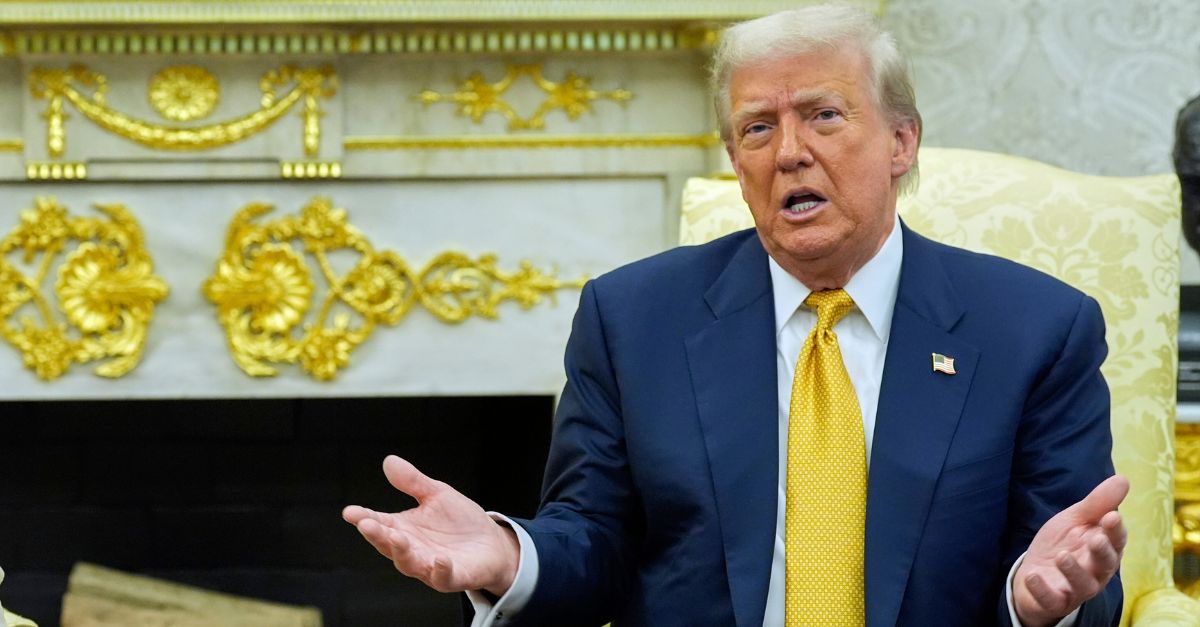
President Donald Trump during a meeting in the Oval Office of the White House, Tuesday, July 22, 2025, in Washington (AP Photo/Alex Brandon).
The Trump administration must continue financing millions of dollars in grants for school mental health services, a federal judge ruled.
The Department of Education stated its intention this spring to halt grant funding for many recipients, in most cases beginning in December. However, U.S. District Judge Kymberly Evanson's 26-page order issued on Monday said not so fast — finding that 16 states that sued over the decision provided evidence that the slashing of the services would create real harm.
Love true crime? Sign up for our newsletter, The Law&Crime Docket, to get the latest real-life crime stories delivered right to your inbox.
She provided one specific example — of the University of Buffalo stating that the discontinuation of its Mental Health Professional Demonstration Grant Program (MHSP) would force it to terminate 10 internship placements.
"This will cause significant harm to both students and rural communities in western New York," Evanson wrote. "Other public universities in California, Colorado, Connecticut, [etc.] created similar training programs and describe similar immediate harms stemming from the abrupt end of partnerships with state and local agencies, loss of staff and graduate student employees, mid-year cancellation of scholarships and research projects, and the immediate loss of services currently being provided to students in Plaintiffs States via the Grants."
As the Seattle-based judge recounts, the grants were first issued in 2018 during President Donald Trump's first term. "Recognizing the prevalence of violence and traumatic crises in schools, and the resultant negative effect on the learning environment, Congress allocated appropriations to the Department to 'support learning environments where students feel safe, supported, and ready to learn,'" she wrote.
After the spring 2022 school shooting in Uvalde, Texas, funding for the MHSP and School-Based Mental Health Services Grant Program (SBMH) was "dramatically increased," under the Biden administration. But as Trump returned to office this past January with a vow to reduce government spending, many grant recipients saw their funding cut.
The increase in funding in 2022 was part of the Bipartisan Safer Communities Act, sponsored by then-Florida Sen. and now-Secretary of State Marco Rubio. However, the Education Department in April took aim at the Biden administration for awarding the grants, saying doing so violated "the letter or purpose of Federal civil rights law," per NPR.
In their lawsuit, the 16 states argued that the grant cuts "did not comply" with the Administrative Procedure Act (APA), the federal statute governing agency behavior, and also violated the Constitution's principle establishing a separation of powers between Congress and the executive branch.
The plaintiffs also maintained that none of them were given an individual reasoning for their grants being canceled, with Evanson saying that even the Trump administration acknowledges that "the decisions are generic and identical." As a result, the states say they are "left guessing why the Grants were discontinued."
The federal government has argued that it doesn't need to provide further explanation, as it can decide at its discretion if it is "in the best interest of the federal government to do so." The judge found this argument "not persuasive."
She wrote that when courts review an agency decision, they inspect whether the agency "examined 'the relevant data' and articulated 'a satisfactory explanation' for [the] decision." And she said in this case, "there is no evidence the Department considered any relevant data pertaining to the Grants at issue and it is undisputed that it provided no Grant-specific explanation of the application of the Department's new 'best interest' criteria."
Evanson granted the states' request for a preliminary injunction, barring the Trump administration from effectuating the grant cancellations and ordering a status report within two days of the Monday filing. She noted that the order only applies to the relevant grantees in the 16 states that challenged the decision.
Comments